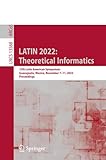LATIN 2022: Theoretical Informatics [electronic resource] : 15th Latin American Symposium, Guanajuato, Mexico, November 7–11, 2022, Proceedings /
Material type: TextSeries: Lecture Notes in Computer Science ; 13568Publisher: Cham : Springer International Publishing : Imprint: Springer, 2022Edition: 1st ed. 2022Description: XVI, 780 p. 174 illus., 113 illus. in color. online resourceContent type:
TextSeries: Lecture Notes in Computer Science ; 13568Publisher: Cham : Springer International Publishing : Imprint: Springer, 2022Edition: 1st ed. 2022Description: XVI, 780 p. 174 illus., 113 illus. in color. online resourceContent type: - text
- computer
- online resource
- 9783031206245
- Computer science
- Computer networks
- Data structures (Computer science)
- Information theory
- Application software
- Computer science -- Mathematics
- Discrete mathematics
- Theory of Computation
- Computer Communication Networks
- Data Structures and Information Theory
- Computer and Information Systems Applications
- Discrete Mathematics in Computer Science
- 004.0151 23
- QA75.5-76.95
Algorithms and Data Structures -- Cutting a tree with Subgraph Complementation is hard, except for some small trees -- Elastic-Degenerate String Matching with 1 Error -- Median and Hybrid Median K-Dimensional Trees -- Weighted Connected Matchings -- Space-efficient data structure for next/previous larger/smaller value queries -- Near-Optimal Search Time in &-Optimal Space -- Computing and Listing Avoidable Vertices and Paths -- Klee's Measure Problem Made Oblivious -- Approximation Algorithms -- A parameterized approximation algorithm for the Multiple Allocation k-Hub Center -- Theoretical analysis of git bisect -- Pathlength of Outerplanar graphs -- Approximations for the Steiner Multicycle Problem -- Approximation Schemes for Packing Problems with `p-norm Diversity Constraints -- Obtaining Approximately Optimal and Diverse Solutions via Dispersion -- Cryptography -- On APN functions whose graphs are maximal Sidon sets -- On the subfield codes of a subclass of optimal cyclic codes and their covering structures -- Social Choice Theory -- Multidimensional Manhattan Preferences -- Theoretical Machine Learning -- Exact Learning of Multitrees and Almost-Trees Using Path Queries -- Almost Optimal Proper Learning and Testing Polynomials -- Estimating the Clustering Coefficient using Sample Complexity Analysis -- Automata Theory and Formal Languages -- Binary completely reachable automata -- Conelikes and Ranker Comparisons -- The Net Automaton of a Rational Expression -- Embedding arbitrary Boolean circuits into fungal automata -- How many times do you need to go back to the future in Unary Temporal Logic? -- String Attractors and Infinite Words -- Combinatorics and Graph Theory -- On the Zero-sum Ramsey Problem over Zd2 -- On x-diperfect digraphs with stability number two -- Percolation and Epidemic Processes in One-Dimensional Small-World Networks -- A combinatorial link between labelled graphs and increasingly labelled Schroder trees -- Min orderings and list homomorphism dichotomies for signed and unsigned graphs -- On the Zombie number of various graph classes -- Patterns in ordered (random) matchings -- Tree 3-spanners on generalized prisms of graphs -- A General Approach to Ammann Bars for Aperiodic Tilings -- Complexity Theory -- List Homomorphism: Beyond the Known Boundaries -- On the closures of monotone algebraic classes and variants of the Determinant -- MCSP is Hard for Read-Once Nondeterministic Branching Programs -- Bounds on oblivious multiparty quantum communication complexity -- Improved Parallel Algorithms for Generalized Baumslag Groups -- Computational Geometry -- Piercing Pairwise Intersecting Convex Shapes in the Plane -- Local routing algorithms on Euclidean spanners with small diameter -- On r-Guarding SCOTs - a New Family of Orthogonal Polygons -- Complexity Results on Untangling Red-Blue Matchings -- On Vertex Guarding Staircase Polygons -- On the Complexity of Half-Guarding Monotone Polygons.
This book constitutes the proceedings of the 15th Latin American Symposium on Theoretical Informatics, LATIN 2022, which took place in Guanajuato, Mexico, in November 2022. The 46 papers presented in this volume were carefully reviewed and selected from 114 submissions. They were organized in topical sections as follows: Algorithms and Data Structures; Approximation Algorithms; Cryptography; Social Choice Theory; Theoretical Machine Learning; Automata Theory and Formal Languages; Combinatorics and Graph Theory; Complexity Theory; Computational Geometry. Chapter “Klee’s Measure Problem Made Oblivious” is available open access under a CC BY 4.0 license.


There are no comments on this title.